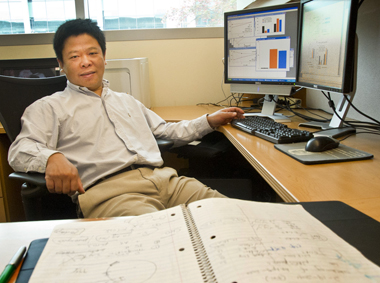UAlbany Biologist Finds Malfunctioning Heart Molecule Can Trigger Arrhythmia
 |
|
UAlbany biologist Haijun Chen believes the future of medicine is in preventing disease before it happens. (Photo Mark Schmidt) |
ALBANY, N.Y. (June 17, 2011) - A University at Albany biologist and his research team have discovered that a tiny cardiac molecule may have major implications for understanding irregular heartbeat, or arrhythmia. Haijun Chen, a UAlbany assistant professor of biological sciences, published his and his team's findings in the June 7 issue of Science Signaling.
When the potassium ion level in the blood drops, cardiac cells become abnormal, causing arrhythmia. Chen's team discovered that one molecule, which is selected to transport potassium ions in cardiac cells, loses its selectivity and results in abnormal behaviors of cardiac cells, triggering arrhythmia.
“Nobody knew why the cardiac cells were changing,” said Chen, who joined the University in the fall of 2007. “Discovering that this one molecule loses its selectivity is an important piece of information.”
Chen believes the future of medicine is in preventing disease before it happens.
“Many people for many reasons have low potassium in the blood, which causes cardiac arrhythmia,” he said. “When people have low potassium levels, it is dangerous. For more than thirty years, no one understood why this happened. We are the first to give our hypothesis as to why this happens.”
Potassium is a mineral that helps muscles contract. The heart muscle requires normal levels of potassium to keep beating properly.
“Cancer patients need to pay attention as well,” he added. “All kinds of chemical therapies lower the potassium concentrations in the blood. For example, there are side effects on the kidneys from chemotherapy. These side effects in the kidneys lower the potassium in the blood and will cause cardiac arrhythmia."
The research was funded by a $260,000 four-year American Heart Association National Scientist Development Grant, plus start-up funding and assistance from UAlbany. Chen has received a Grant-in-Aid award from the American Heart Association that begins in July. That award is $198,000 for three years, to fund his research on “Cardiac background potassium channels in hypokalemia.”
Chen began his studies in his native China as a biomedical engineering student at Huazhong University of Science and Technology. During his internship, he met many dialysis patients. “I saw a lot of young people in their 20s, some of them had only six months to live,” he said.
While observing a dialysis machine with other students, he saw a young patient who needed a kidney transplant, and who was not likely to get the needed surgery, which was very expensive and relatively rare at that time, during the 1980s in China. “It motivated me to make a switch to medicine,” said Chen.
He graduated from a medical university, and earned a doctorate in physiology in Germany. Later, Chen studied molecular cardiology at the Yale School of Medicine.
The second stage of his research will examine whether certain cardiac molecules may help protect the heart from damage during a cardiac event, such as stroke or heart failure.
![]() For more news, subscribe to UAlbany's RSS headline feeds
For more news, subscribe to UAlbany's RSS headline feeds
A comprehensive public research university, the University at Albany-SUNY offers more than 120 undergraduate majors and minors and 125 master's, doctoral and graduate certificate programs. UAlbany is a leader among all New York State colleges and universities in such diverse fields as atmospheric and environmental sciences, business, education, public health,health sciences, criminal justice, emergency preparedness, engineering and applied sciences, informatics, public administration, social welfare and sociology, taught by an extensive roster of faculty experts. It also offers expanded academic and research opportunities for students through an affiliation with Albany Law School. With a curriculum enhanced by 600 study-abroad opportunities, UAlbany launches great careers.


